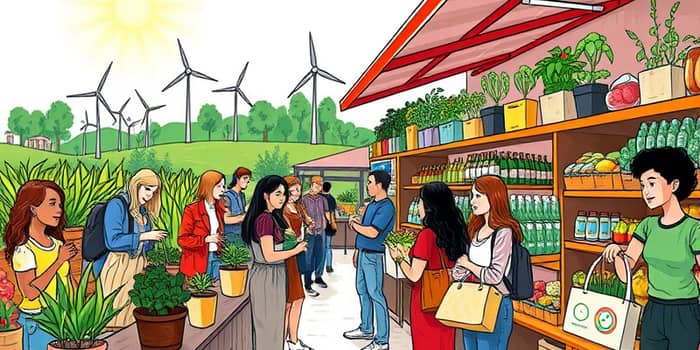
As we enter 2025, the intersection of consumer values and corporate responsibility is redefining how markets evolve. Every purchase becomes a statement of belief, and every company decision reflects societal priorities.
In this transformative era, understanding the forces behind ethical sourcing and environmental impact is essential for individuals and businesses alike.
At its core, conscious consumerism refers to the practice of making purchase decisions based on a brand’s social, environmental, and ethical practices. Shoppers increasingly seek products that align with their values around labor rights, biodiversity preservation, and resource conservation.
Sustainability has moved from a niche concern to a mainstream economic driver. Regulators, investors, and stakeholders alike demand that companies measure and report on carbon footprints, waste reduction, and community impact. Today, sustainability sits at the heart of business strategy, influencing everything from product design to financial planning.
Recent studies reveal that 78% of global consumers value sustainability. Among those, 62% actively seek out sustainable products, signaling that environmental ethics now guide everyday shopping habits.
Despite high interest, price sensitivity remains a barrier: 74% feel eco-friendly products are costlier, and willingness to pay a premium drops to 38% in markets like Japan.
Brand trust and loyalty soar when companies commit to transparent reporting builds consumer trust. An impressive 92% of shoppers are more likely to support purpose-driven brands, which grow three times faster than their competitors.
Generational analysis shows that Gen Z leads the charge for transparency and premium purchases, closely followed by Millennials. Baby Boomers and Gen X remain committed but slightly more price-sensitive.
Companies are evolving their operations to meet conscious consumer demands. Circular economy models, where materials are reused and repurposed, are gaining traction. Experts estimate that a fully circular approach could reduce ocean-bound plastics by 80% and greenhouse gas emissions by 25%.
These innovations reflect a broader trend: companies that prioritize environmental stewardship and social responsibility gain both investor confidence and consumer loyalty.
Today’s consumers demand more than marketing slogans. They expect companies to demonstrate real-world impact through third-party certifications, detailed impact reports, and community engagement programs.
Greenwashing remains a concern: while 79% of shoppers trust sustainability claims, 29% remain skeptical. Authenticity is non-negotiable; credibility requires verifiable data, genuine storytelling, and consistent performance against publicly stated goals.
Social media platforms accelerate discovery, but word-of-mouth via family and friends remains the most trusted recommendation channel. Brands that cultivate advocacy networks and user-generated content see higher retention and organic growth.
Sustainable products now hold a 17% market share and are growing 2.7 times faster than conventional goods, with a compound annual growth rate of 7.34%. Nearly half of Fortune 500 earnings derive from business lines aligned with the United Nations Sustainable Development Goals.
Investment in sustainability assets is set to surpass $50 trillion by 2025, accounting for over one-third of global assets under management. ESG-focused funds are projected to reach $33.9 trillion by 2026, illustrating the financial community’s commitment to long-term, responsible growth.
Despite progress, significant hurdles remain. Higher price points for sustainable goods limit access, especially in emerging markets. Around 36% of consumers express a desire to buy eco-friendly products but are held back by cost or availability constraints.
On the corporate side, only 36% of businesses fully disclose sustainability data, creating transparency gaps. Companies must overcome internal silos, invest in robust data collection systems, and align executive compensation with environmental and social metrics.
By adopting these strategies, companies can transform challenges into opportunities, deepening customer engagement and securing long-term resilience.
The economy of tomorrow will be built on the principles of conscious consumption and sustainable innovation. Companies that integrate environmental and social considerations into their DNA will not only thrive but set new benchmarks for profitability and impact.
As 91% of corporate leaders acknowledge their duty to address sustainability, the social license to operate hinges on meeting evolving consumer and investor expectations. The path ahead is clear: embrace purpose, champion transparency, and empower individuals to make choices that shape a healthier planet and a more equitable economy.
References





